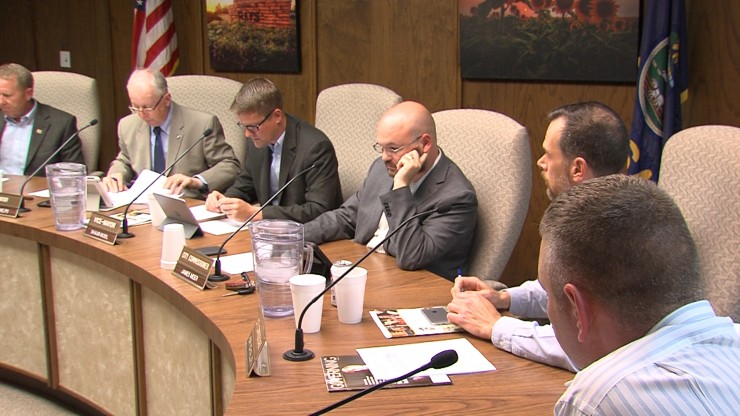
By BECKY KISER
Hays Post
The economic development policy of the city of Hays has been updated to reflect changes in its business recruitment techniques.
City commissioners discussed the proposed changes during last week’s work session and voted unanimously Thursday night to adopt the revised document.
There are two notable changes to the policy in seeking economic development incentives from the city, one new inclusion–“Statement of Process” and one removal–“Big Box” requirements for retail applicants.

No longer are there requirements that any retail applicant must meet the criteria of 50,000 square feet, $10 million a year in retail sales, and employ 25 or more employees.
“I think 25 to 30 years ago the economic development goals were to go for some heavy-hitters–big employers–and so I think that’s where that language came from,” said Mayor Eber Phelps, “to set up incentives for somebody to guarantee 100, 200, 300, 400 employees.
“In recent years, I think we’re looking more at quality companies coming here with maybe 10 or 20 employees. Those add a lot of benefit.
“Striking the language at the beginning of this policy on the square footage and $10 million (in annual revenue) opens up the possibilities where incentives are available to those (smaller businesses).”
Hays City Manager Toby Dougherty and Ellis County Coalition for Economic Development (ECCED) Executive Director Aaron White both told commissioners last week that there is a business planning to submit a “Community Improvement District” (CID) application if the “Big Box” requirements were removed.
Commissioner Henry Schwaller, who was absent during last week’s work session, said Thursday “the changes we’re making are the best we’ve made in a long time. They make sense. They give more power to the Coalition to assist us, which is why it was created.”

The addition of a “Statement of Process” was requested by the commission after rejecting plans for a travel plaza at the west intersection of Interstate 70 in Hays by Colby-based NWK Investments LLC. It requires a review by White and a term sheet to be prepared before the commission will consider a proposal.
Schwaller also praised the added requirements in an applicant’s business plan to include more details as well as a cost/benefit analysis.

“The applicant should know the financial impact on both sides (Hays and the prospective business) and whether financial incentives are actually needed,” said Dougherty.
Vice-Mayor Shaun Musil liked the changes. “I think it makes it more business friendly to be able to work with developers. Hopefully, it makes it easier to come to Hays.”
However, Musil said he still has a different goal–“not to give any benefits, but I don’t think that’s possible any more,” he acknowledged.
“I know we’ve all heard that there’s people wanting to come out there by Walmart and Home Depot where we have infrastructure. It sure would be nice to see somebody breaking ground out there and bring some new business to maybe get our sales tax revenues turned around, ” Musil said.
Eight of the past ten months sales tax collections for Hays have been down as compared to the same time period in 2015, according to Finance Director Kim Rupp.
Sales tax revenues are a major revenue stream for the city’s General Operating Fund, a point that is emphasized more heavily in the new economic development policy.
Commissioners also redefined the TIF–Tax Increment Financing to make only property taxes eligible. Sales taxes are no longer part of a TIF incentive.
Click here to read the final draft changes in the Hays Economic Development Policy.
